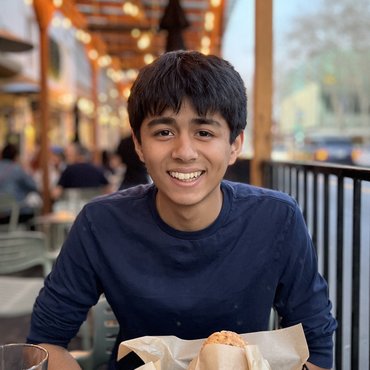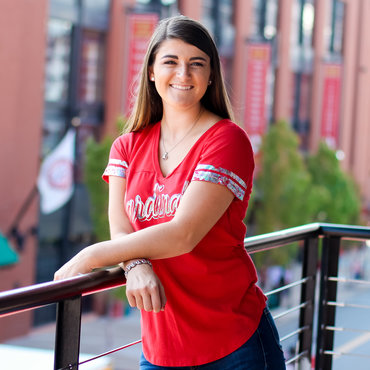
Athena Xue, ’24
Bringing joy through art in elder care
When I was five, my grandparents moved to live with my family in the United States. I grew up taking care of them, helping them to find a home amid the unfamiliar language and culture. I pointed out pretty spots on neighborhood walks, made English worksheets to teach them common phrases, and toured farmer’s markets and grocery stores with them, where we read labels and practiced counting nickels and quarters.
My close bond with my grandparents has helped me develop a passion for bringing joy to older adults. I feel fulfilled when I can make a positive difference in their lives.
But caring for my grandparents also brought my attention to a world of challenges that many seniors face, which have been exacerbated by the pandemic. The social isolation in the past two years has caused the older adults in our community to experience increased loneliness, depression, and cognitive and physical health decline. For those like my grandparents who love seeing friends and enjoying the outdoors, the pandemic has been exhausting.
Fueled by my passion for elder care, I sought opportunities to serve the older adults in my community. At Stanford, I volunteered with the art therapy group Healing Strokes, where I learned that engaging in the arts could improve health by promoting positive feelings and enhancing physical ability. Having always been a lover and creator of art, I felt thrilled by this discovery. I wanted to be able to bridge my two passions––elder care and art––and find a way to bring support to senior residents during the pandemic.
My search brought me to Peninsula Volunteers, Inc., an organization that provides services to senior clients. I completed a Cardinal Quarter summer fellowship serving virtually with their adult day service center, Rosener House, which offers care for seniors, including health services and activity programs that transitioned online during the pandemic.
I started each morning in the music and games groups with cheerful sing-a-longs and rounds of trivia. I loved the simple act of spending time with the clients, laughing with them, being curious, and remaining a positive, supportive presence. I didn’t know I could connect with people so deeply over Zoom.
Beyond working in existing programs, I wanted to creatively engage participants who were stuck at home through art. I helped implement an art program and design a curriculum, grouping activities by category: reflection and thinking, motor skills, and relaxation.
The group art sessions were held over Zoom, where I got to work with some participants individually and cater activities to their interests, including folding origami, painting, and shaping clay. I enjoyed brainstorming ideas together and watching them find community while sharing their work with each other. The Art-To-Go kits I assembled allowed participants to take home crafting kits that guided them through a new activity each week.
I loved the little moments I spent connecting with each person: discovering that one participant’s favorite colors were pink and purple, hearing about another person’s stories about living in Japan, and learning that some of them studied art in college.
Many of the participants I worked with were hard-of-hearing, faced mobility challenges, or were experiencing dementia. Helping them reminisce about old memories, practice movement, and find joy in the process of art was a blessing. Every day, I got to see someone smile as they told me about themselves or showed me their art.
My work at Rosener House gave me purpose, energy, and emotional fulfillment. It felt wonderful knowing that the participants could talk and laugh with others even while in isolation.
In my future pursuits, I want to continue to work closely with older adults to promote both mental and physical well-being. I have seen how powerful human connection, positivity, and genuine care can be in changing someone’s day. Whether in healthcare or another field, I want to touch people’s lives and care for and support older adults through difficult times.


